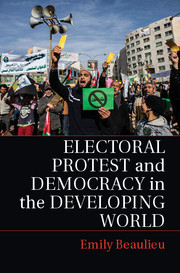Book contents
- Frontmatter
- Dedication
- Contents
- Tables and Figures
- Acknowledgments
- 1 Introduction
- 2 Elite Bargaining and Elections in the Developing World
- 3 Causes of Electoral Protest
- 4 Election Day and Its Aftermath
- 5 Democratic Consequences of Electoral Protest
- 6 Conclusion
- Appendix A Data Description and Robustness Checks
- Appendix B. Boycotts
- Appendix C. Post-Election Mass Demonstrations
- Appendix D. Election-Related Reforms
- References
- Index
- References
3 - Causes of Electoral Protest
Published online by Cambridge University Press: 05 June 2014
- Frontmatter
- Dedication
- Contents
- Tables and Figures
- Acknowledgments
- 1 Introduction
- 2 Elite Bargaining and Elections in the Developing World
- 3 Causes of Electoral Protest
- 4 Election Day and Its Aftermath
- 5 Democratic Consequences of Electoral Protest
- 6 Conclusion
- Appendix A Data Description and Robustness Checks
- Appendix B. Boycotts
- Appendix C. Post-Election Mass Demonstrations
- Appendix D. Election-Related Reforms
- References
- Index
- References
Summary
Every major opposition party boycotted Cameroon's presidential election in October 1997. Even though there were no reports of formal bargaining between incumbent and opposition prior to the boycott, the incumbent and opposition had begun to take action in response to each other's behavior much earlier that year. In January 1997, the opposition complained about problems with voter registration, and then President Biya postponed the legislative elections that had been scheduled for March to respond to opposition complaints. During this time the president also created a new election management body (Cameroon: A Transition in Crisis, Article 19, 10). After the delayed legislative elections were held in May, opposition parties complained about the president's manipulation of constituencies and voter registration, attributing the manipulation to the new, government-controlled electoral management body the president had created. In threatening to boycott the upcoming October presidential election, the opposition actors described the newly created system as “fraudulent” and reported their concerns to representatives of the French government. (Cameroon is a former French colony and still enjoys a particularly close relationship with that country.) A representative of the French Foreign Ministry indicated that France would be paying close attention to the election and expressed a preference for opposition participation. But despite opposition threats to boycott and the expressed preferences of powerful international actors, incumbent president Paul Biya refused to create an independent election management board, retaining instead the management body controlled by the government. The opposition, in response, refused to participate and boycotted the election.
- Type
- Chapter
- Information
- Electoral Protest and Democracy in the Developing World , pp. 55 - 78Publisher: Cambridge University PressPrint publication year: 2014



